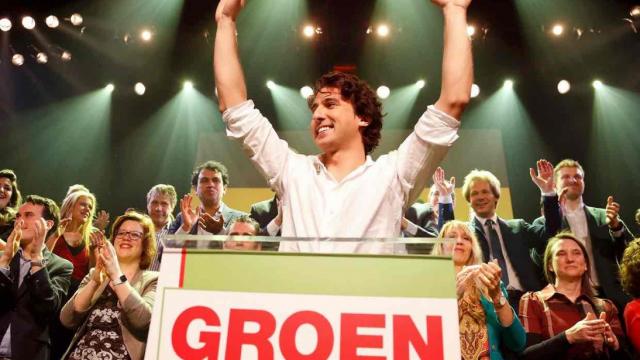
It is far too early to say whether Jesse Klaver’s GreenLeft will be a party of government for the first time in its history. But for the 30-year-old leader of a political party, the Netherlands’ youngest ever, it was not a bad election.
GreenLeft was the big winner in Wednesday’s poll, leaping from four MPs to 14 in the 150-seat parliament, topping the bill in Amsterdam and overtaking the stricken social democratic PvdA to become the largest party of the left nationally.
As traditional left and centre-left parties suffer across Europe in countries including Italy, France and Britain, the Dutch GreenLeft, formed 25 years ago by a merger of communists, pacifists, evangelicals and radicals, is growing fast.
A large part of its success is down to Klaver, a boyish figure in jeans, open-necked shirt and rolled-up sleeves who was first elected as an MP at the age of 24 and took over the leadership of GreenLeft in May 2015. Since then, under the “Jessiah”, as he is nicknamed, the party has gained 7,000 new members, nearly half of them under 30.
Something of a throwback to classic 1970s Dutch ideals of openness and radicalism, Klaver has a Moroccan father and a mother of Indonesian descent. The far-right populism of Geert Wilders, rather than Muslim immigration, is the real threat to Dutch culture and traditions, he has repeatedly said.
Properly leftwing parties in Europe had to fight the rise of the far right by standing up for their ideals, he said on Wednesday.
“What I would say to all my leftwing friends in Europe: don’t try to fake the populace,” he said. “Stand for your principles. Be straight. Be pro-refugee. Be pro-European. We’re gaining momentum in the polls. You can stop populism.”
In the Netherlands’ fragmented political scene, Klaver hoped to win enough seats to help form a government without the centre-right, liberal VVD party of the outgoing prime minister, Mark Rutte, the winner of Wednesday’s poll.
Klaver insisted on Thursday that should still be an option given GreenLeft’s particularly strong performance, although he conceded the Dutch political landscape was now “extremely complicated”.
Perhaps more likely – and he did not rule it out – is that he will be asked to lend support to a centre-right coalition so it can secure a majority. That, though, might force him to choose between his ideals and entering government.
The party is unashamedly pro-European and campaigned on a mix of environmental and old-fashioned leftwing policies: tighter bonus rules, zero tax avoidance, sharing of refugees across the EU and obligatory limits on greenhouse gas emissions.
Perhaps understandably, its message resonates particularly strongly with young urban voters. Besides Amsterdam, GreenLeft also performed well in university cities such as Groningen, Utrecht and Nijmegen.
“Our message speaks to the population of Amsterdam, and that’s to do with the fact that Amsterdam is a metropolis with lots of young, well educated people,” said Rutger Groot Wassink, the leader of the party’s group on Amsterdam city council.
GreenLeft is the main opposition group on the council behind the progressive liberals of D66 – who also fared well in Wednesday’s parliamentary election. “What we share is a very open and tolerant view of the world, socially and culturally, whether about abortion, euthanasia or the soft drugs policy,” Groot Wassink said.
“But I think the reason we’ve overtaken D66 is that we have a social-economic message of sharing fairly. In a city like Amsterdam, where inequality is rising, integration is an ongoing process, but we’ve shown it can be dealt with differently.”
Klaver built his strong following through social media, town-hall style meetings and finally rallies, which were consistently among the campaign’s largest – including an Amsterdam meeting that drew an audience of more than 5,000, plus 5,000 more following live on Facebook.
Inspired by Barack Obama’s US campaigns, the party’s election operation was aimed at breaking the mould of generally staid and often dry Dutch electioneering by creating a mass movement behind a charismatic personality.
Groot Wassink said the success could be a blueprint for green parties in countries such as Britain. “The British system is complicated, but I think the Greens ought to be able to make an impact. People in cities understand the wellbeing of our planet is important, that we need to get off fossil fuels, organise the economy differently.”
Targeting the younger generation has its drawbacks: they turn out in smaller numbers in elections, the councillor said. But he said the party had also won sympathy from more traditional leftwing voters in a city that was a PvdA stronghold for two generations.
GreenLeft benefited hugely from the collapse of the PvdA, which was severely punished by voters after pushing through a series of unpopular measures as part of the ruling coalition, such as raising the retirement age and cutting benefits.
Backing also came from voters concerned about climate change in a low-lying country exposed to its dangers. Party activist Carolijn Hofte, 56, previously voted for liberal parties such as the VVD and D66, but said the environment was too pressing an issue to be ignored.
GreenLeft’s focus on social equality and renewable energy was the right one for the future, Hofte said. “I don’t think the current government has divided things equally,” she said.
“The rich are getting richer, the poor are getting poorer, and people on the lower end of the scale are being forgotten. But the other thing is the climate. We need to do something about it – we really can’t stand still any longer.”
3 WAYS TO SHOW YOUR SUPPORT
- Log in to post comments











